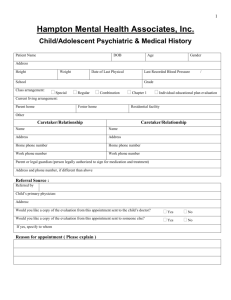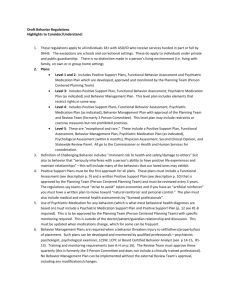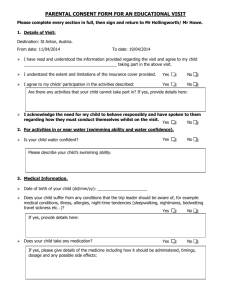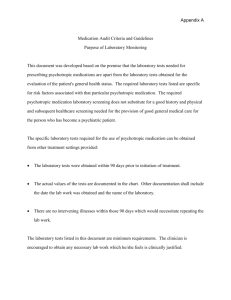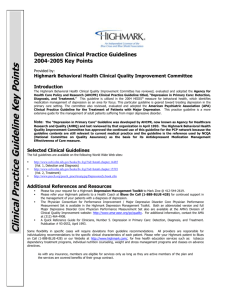APA-ACOG guidelines for treatment during pregnancy 2009
advertisement
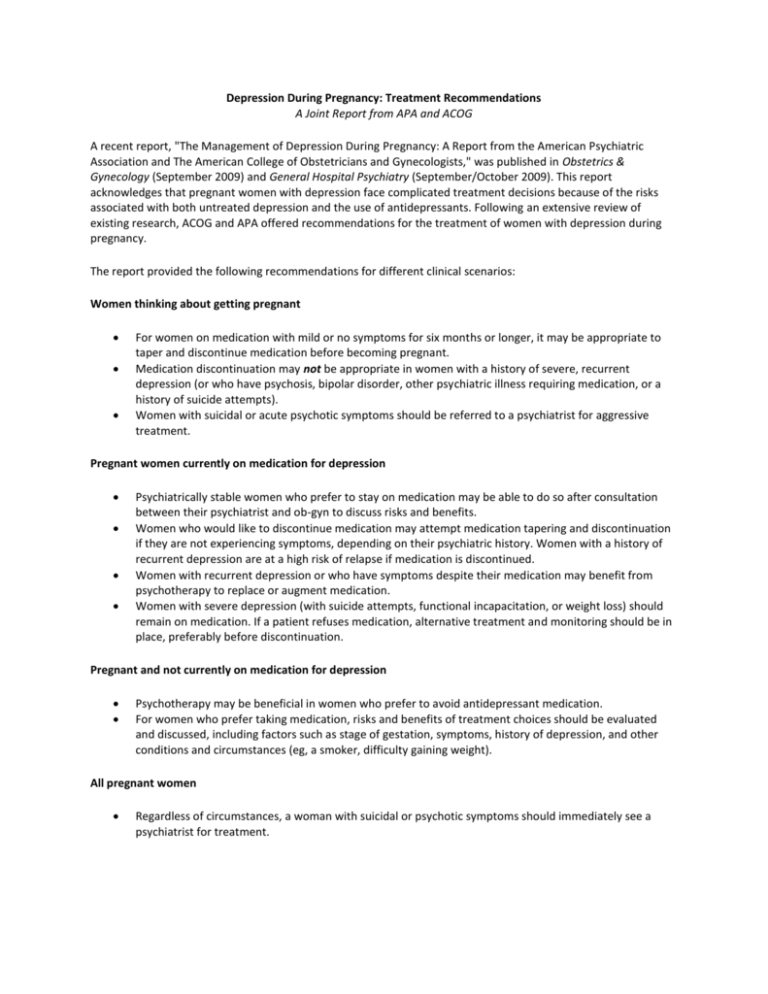
Depression During Pregnancy: Treatment Recommendations A Joint Report from APA and ACOG A recent report, "The Management of Depression During Pregnancy: A Report from the American Psychiatric Association and The American College of Obstetricians and Gynecologists," was published in Obstetrics & Gynecology (September 2009) and General Hospital Psychiatry (September/October 2009). This report acknowledges that pregnant women with depression face complicated treatment decisions because of the risks associated with both untreated depression and the use of antidepressants. Following an extensive review of existing research, ACOG and APA offered recommendations for the treatment of women with depression during pregnancy. The report provided the following recommendations for different clinical scenarios: Women thinking about getting pregnant For women on medication with mild or no symptoms for six months or longer, it may be appropriate to taper and discontinue medication before becoming pregnant. Medication discontinuation may not be appropriate in women with a history of severe, recurrent depression (or who have psychosis, bipolar disorder, other psychiatric illness requiring medication, or a history of suicide attempts). Women with suicidal or acute psychotic symptoms should be referred to a psychiatrist for aggressive treatment. Pregnant women currently on medication for depression Psychiatrically stable women who prefer to stay on medication may be able to do so after consultation between their psychiatrist and ob-gyn to discuss risks and benefits. Women who would like to discontinue medication may attempt medication tapering and discontinuation if they are not experiencing symptoms, depending on their psychiatric history. Women with a history of recurrent depression are at a high risk of relapse if medication is discontinued. Women with recurrent depression or who have symptoms despite their medication may benefit from psychotherapy to replace or augment medication. Women with severe depression (with suicide attempts, functional incapacitation, or weight loss) should remain on medication. If a patient refuses medication, alternative treatment and monitoring should be in place, preferably before discontinuation. Pregnant and not currently on medication for depression Psychotherapy may be beneficial in women who prefer to avoid antidepressant medication. For women who prefer taking medication, risks and benefits of treatment choices should be evaluated and discussed, including factors such as stage of gestation, symptoms, history of depression, and other conditions and circumstances (eg, a smoker, difficulty gaining weight). All pregnant women Regardless of circumstances, a woman with suicidal or psychotic symptoms should immediately see a psychiatrist for treatment. Background on the report APA and ACOG convened a work group to critically evaluate and summarize information about the risks associated with depression and antidepressant treatment during pregnancy. The group included clinical research experts within these two medical specialties and a developmental pediatrician. Researchers reviewed cumulative existing research relating to antidepressant use in pregnancy; however, available research has not yet adequately controlled for other factors that may influence birth outcomes, including maternal illness or problematic health behaviors that can adversely affect pregnancy. Limitations of existing research include: Few studies of antidepressants and birth outcomes assessed the mothers' psychiatric condition Confounding factors that influence birth outcomes (eg, poor prenatal care and drug/alcohol/nicotine use) were often not controlled Pregnancy complications (eg, nausea, preeclampsia) occur at a higher rate in depressed than nondepressed women The report authors are Kimberly A. Yonkers, MD; Katherine L. Wisner, MD, MS; Donna E. Stewart, MD, FRCPC; Tim F. Oberlander, MD, FRCPC; Diana L. Dell, MD, FACOG, DFAPA; Nada Stotland, MD, MPH; Susan Ramin, MD, FACOG; Linda Chaudron, MD, MS; and Charles Lockwood, MD, FACOG. The American College of Obstetricians and Gynecologists (ACOG) www.acog.org The American Psychiatric Association www.psych.org and www.HealthyMinds.org.
